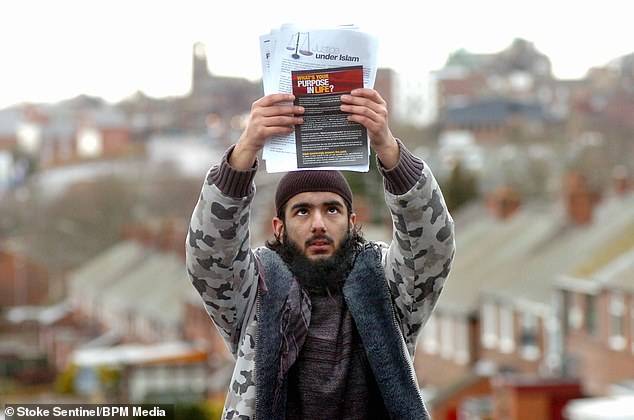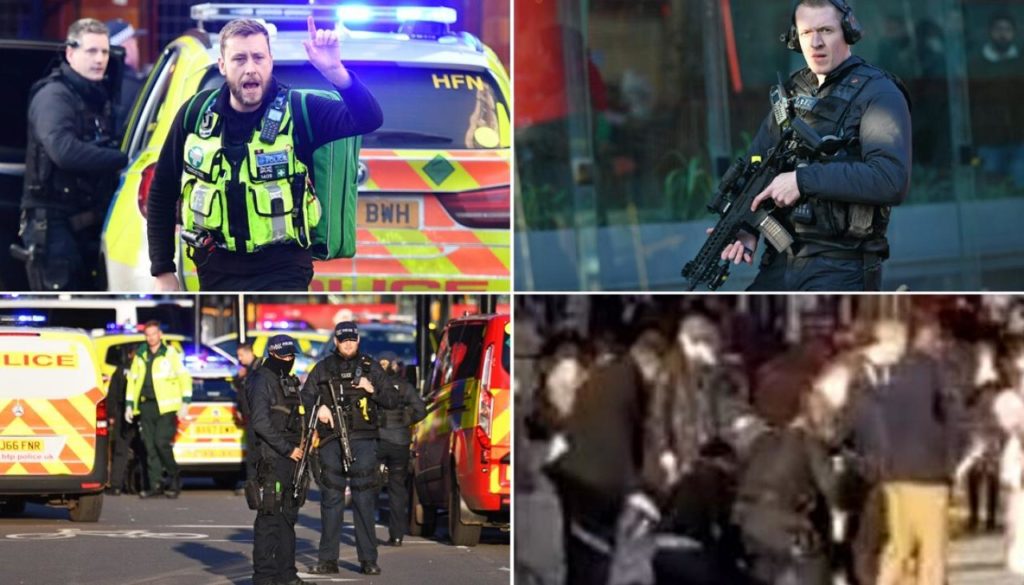
Usman Khan was released from prison in December last year after serving seven years, half of his sentence, for his part in a plot to blow up the London Stock Exchange in London and establishing a ‘madrasah style’ military training camp in Kashmir, Pakistan, to train a new generation of British militants in 2012.
But just 11 months after being released, Khan, 28, a resident of Stafford, West Midlands, deemed a “serious Jihadi” by the sentencing judge, still wearing an electronic tag while under police curfew restrictions, stabbed two people to death and injured three others before being shot dead by police.
https://twitter.com/Razarumi/status/1201235962333990915
Khan would have most likely been engaged in a U.K Home Office run radicalisation programme called Desistance and Disengagement programme (DDP), a programme of intensive monitoring designed to detract convicted extremists away from religious ideology. Little is known about the programme, despite the U.K government making it a key component of its renewed terrorism strategy. The programme has run since 2016, as an extension of a previous terrorism strategy Prevent, to target all terrorism and terrorism related offenders released from prison and on probation.
On his release from prison Khan would also have been managed by a multi-agency group pf police, prison and probation officer.
Despite the implemented preventative measures, on Friday Khan travelled as the guest of Cambridge university criminology conference on prisoner education to London. Given his previous conviction in the London Stock Exchange plot, tagging restrictions would have required permission to travel. Why this was granted has ignited a politicians’ blame game – raising questions about judicial policy, terrorist management and rehabilitation.
 The two men vying to become Britain’s next prime minister clashed over who is to blame for the early release of a convicted terrorist who murdered two people on Friday in central London.
The two men vying to become Britain’s next prime minister clashed over who is to blame for the early release of a convicted terrorist who murdered two people on Friday in central London.
Jeremy Corbyn leader of the opposition Labour party, told a British Sunday show, “Our probation service was half privatized, is not up to scratch, is not able to deal with the number of cases they have to deal with,” he told Sky’s Sophy Ridge on Sunday show.
In an interview with the BBC’s Andrew Marr show, British Prime Minister, Boris Johnson, has laid the blame on Labour.“How could he be out so early? The answer is I’m afraid that he was out because he was on automatic early release. When the judges reviewed his sentence in 2012, they had no option but to comply with the law that Labour brought in in 2008,” Johnson said.
However, the Conservatives have been repeatedly criticized for cutting spending on U.K local police authorities, prisons and law enforcement agencies since 2010. Under austerity measures, cuts to the probation service diminished efforts at effective oversight. The Ministry of Justice reported a “real-terms cumulative decrease” of 40 percent in its funding between 2010 and 2017.
The National Probations Service’s Midlands team, would have over seen Khan’s incarceration. An inspection report on this service in December 2018, raised concern about lack of staff and funding.
https://twitter.com/SkyNews/status/1201487429028311040
“There are substantial staff shortages, impacting on probation officer workloads and the quality of service delivery,” inspectors warned. “NPS Midlands has plans to recruit and train new staff to tackle the shortfall of probation officers within the next two years, but meanwhile its ability to deliver consistently good work is hindered.”
Ian Acheson, a former prison governor who conducted an independent review of Islamist extremism in prisons for the government five years ago, said, Conservative ministers ignored his findings in 2016 when he warned that the parole system couldn’t cope with terrorists. Acheson reported what he called, “serious deficiencies in almost every aspect of the management of terrorist offenders through the systems.” Only eight of his 69 recommendations for improvement were accepted. Acheson added, although there are currently only 220 people in the prison system who demonstrate a threat level similar to Khan. Given the experience and training of the British prison authorities this number should be manageable – however “the potential for harm is huge.”
https://twitter.com/alykhansatchu/status/1201543524023513089
Former head of the probation officer’s union Napo, Harry Fletcher, said an internal investigation will focus on what level of support, supervision and surveillance Khan was under on his release to ensure he did not re-engage with terrorist activity. “He was clearly a candidate for 24-hour surveillance, but there just aren’t the resources to keep all those who pose a threat under the level of scrutiny that we might want,” he said. Authorities estimate surveillance of this level on an individual requires at least 12 police officers every day, depending on the nature of the risk posed.
The 2017 coroners report into the London Bridge attack, which led to the deaths of eight people, highlighted the rise of relatively unsophisticated plots — involving knives, as used by Khan, rather than guns or bombs, resulted in an “unprecedented challenge” to MI5 and counterterror police. “Although attack methodologies of low sophistication may often result in lower tallies of dead and injured, they can be harder to detect in the planning and preparation phases,” the report read. In the absence of physical surveillance, former terrorists are overseen by probation officers and enrolled in the Desistance and Disengagement programme. The report said.
But just 11 months after being released, Khan, 28, a resident of Stafford, West Midlands, deemed a “serious Jihadi” by the sentencing judge, still wearing an electronic tag while under police curfew restrictions, stabbed two people to death and injured three others before being shot dead by police.
https://twitter.com/Razarumi/status/1201235962333990915
Khan would have most likely been engaged in a U.K Home Office run radicalisation programme called Desistance and Disengagement programme (DDP), a programme of intensive monitoring designed to detract convicted extremists away from religious ideology. Little is known about the programme, despite the U.K government making it a key component of its renewed terrorism strategy. The programme has run since 2016, as an extension of a previous terrorism strategy Prevent, to target all terrorism and terrorism related offenders released from prison and on probation.
On his release from prison Khan would also have been managed by a multi-agency group pf police, prison and probation officer.
Despite the implemented preventative measures, on Friday Khan travelled as the guest of Cambridge university criminology conference on prisoner education to London. Given his previous conviction in the London Stock Exchange plot, tagging restrictions would have required permission to travel. Why this was granted has ignited a politicians’ blame game – raising questions about judicial policy, terrorist management and rehabilitation.
 The two men vying to become Britain’s next prime minister clashed over who is to blame for the early release of a convicted terrorist who murdered two people on Friday in central London.
The two men vying to become Britain’s next prime minister clashed over who is to blame for the early release of a convicted terrorist who murdered two people on Friday in central London.Jeremy Corbyn leader of the opposition Labour party, told a British Sunday show, “Our probation service was half privatized, is not up to scratch, is not able to deal with the number of cases they have to deal with,” he told Sky’s Sophy Ridge on Sunday show.
In an interview with the BBC’s Andrew Marr show, British Prime Minister, Boris Johnson, has laid the blame on Labour.“How could he be out so early? The answer is I’m afraid that he was out because he was on automatic early release. When the judges reviewed his sentence in 2012, they had no option but to comply with the law that Labour brought in in 2008,” Johnson said.
However, the Conservatives have been repeatedly criticized for cutting spending on U.K local police authorities, prisons and law enforcement agencies since 2010. Under austerity measures, cuts to the probation service diminished efforts at effective oversight. The Ministry of Justice reported a “real-terms cumulative decrease” of 40 percent in its funding between 2010 and 2017.
The National Probations Service’s Midlands team, would have over seen Khan’s incarceration. An inspection report on this service in December 2018, raised concern about lack of staff and funding.
https://twitter.com/SkyNews/status/1201487429028311040
“There are substantial staff shortages, impacting on probation officer workloads and the quality of service delivery,” inspectors warned. “NPS Midlands has plans to recruit and train new staff to tackle the shortfall of probation officers within the next two years, but meanwhile its ability to deliver consistently good work is hindered.”
Ian Acheson, a former prison governor who conducted an independent review of Islamist extremism in prisons for the government five years ago, said, Conservative ministers ignored his findings in 2016 when he warned that the parole system couldn’t cope with terrorists. Acheson reported what he called, “serious deficiencies in almost every aspect of the management of terrorist offenders through the systems.” Only eight of his 69 recommendations for improvement were accepted. Acheson added, although there are currently only 220 people in the prison system who demonstrate a threat level similar to Khan. Given the experience and training of the British prison authorities this number should be manageable – however “the potential for harm is huge.”
https://twitter.com/alykhansatchu/status/1201543524023513089
Former head of the probation officer’s union Napo, Harry Fletcher, said an internal investigation will focus on what level of support, supervision and surveillance Khan was under on his release to ensure he did not re-engage with terrorist activity. “He was clearly a candidate for 24-hour surveillance, but there just aren’t the resources to keep all those who pose a threat under the level of scrutiny that we might want,” he said. Authorities estimate surveillance of this level on an individual requires at least 12 police officers every day, depending on the nature of the risk posed.
The 2017 coroners report into the London Bridge attack, which led to the deaths of eight people, highlighted the rise of relatively unsophisticated plots — involving knives, as used by Khan, rather than guns or bombs, resulted in an “unprecedented challenge” to MI5 and counterterror police. “Although attack methodologies of low sophistication may often result in lower tallies of dead and injured, they can be harder to detect in the planning and preparation phases,” the report read. In the absence of physical surveillance, former terrorists are overseen by probation officers and enrolled in the Desistance and Disengagement programme. The report said.
